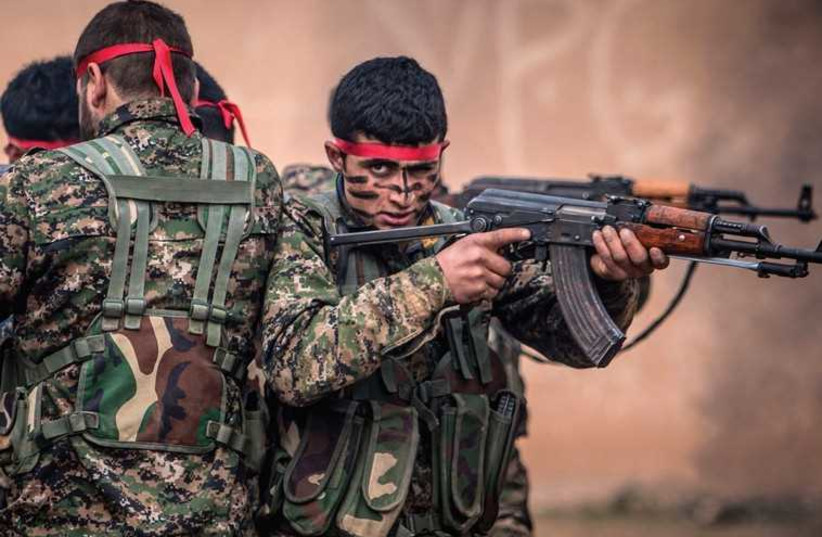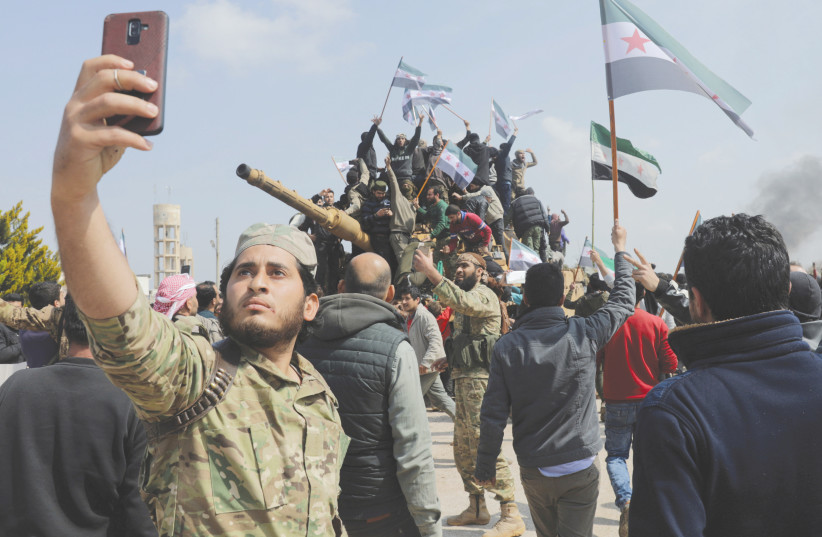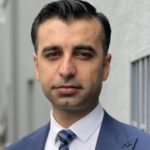Russia’s oft-stated strategic goal in Syria is the reunification of the country under the nominal rule of Syrian President Bashar Assad’s dictatorship. Putin’s reference to “foreign forces” is intended to convey that while Russian and Iranian forces operate in Syria at the invitation of the dictator, other non-Syrian elements, such as the Turkish and American deployments, are there without Assad’s permission.
cnxps.cmd.push(function () { cnxps({ playerId: ’36af7c51-0caf-4741-9824-2c941fc6c17b’ }).render(‘4c4d856e0e6f4e3d808bbc1715e132f6’); });
if(window.location.pathname.indexOf(“/jpost-tech/”)!=-1){ document.getElementsByClassName(“divConnatix”)[0].style.display =”none”; var script = document.createElement(‘script’); script.src = ‘https://static.vidazoo.com/basev/vwpt.js’; script.setAttribute(‘data-widget-id’,’616dd69d1b04080004ac2cc0′); document.getElementsByClassName(‘divVidazoo’)[0].appendChild(script); }else if(window.location.pathname.indexOf(“/israel-news/”) != -1 || window.location.pathname.indexOf(“/omg/”) != -1 || window.location.pathname.indexOf(“/food-recipes/”) != -1 || window.location.pathname.indexOf(“/science/”) != -1){ document.getElementsByClassName(“divConnatix”)[0].style.display =”none”; var script = document.createElement(‘script’); script.src = ‘https://static.vidazoo.com/basev/vwpt.js’; script.setAttribute(‘data-widget-id’,’60fd6becf6393400049e6535′); document.getElementsByClassName(‘divVidazoo’)[0].appendChild(script); }else if(window.location.pathname.indexOf(“/health-and-wellness/”) != -1){ document.getElementsByClassName(“divConnatix”)[0].style.display =”none”; var script = document.createElement(‘script’); script.src = ‘https://player.anyclip.com/anyclip-widget/lre-widget/prod/v1/src/lre.js’; script.setAttribute(‘pubname’,’jpostcom’); script.setAttribute(‘widgetname’,’0011r00001lcD1i_12246′); document.getElementsByClassName(‘divAnyClip’)[0].appendChild(script);}
In response to the Russian escalation, Erdogan beefed up the Turkish military presence along the frontlines. This in turn led to an increased presence of Syrian regime forces. The summit on the 29th was intended to reduce tensions. No joint statement followed it, but Erdogan was quoted as stating that the talks had focused on reaching a “final and sustainable solution” to the Syrian issue.
At the same time, tensions have been building in recent weeks on a different front in Syria – between Turkey and the Kurdish-controlled Autonomous Administration of North East Syria. Turkey claims that the Kurdish YPG organization has increased cross border attacks in recent weeks.

Erdogan described an attack on the Turkish controlled town of Azaz on October 11 as representing the “final straw.” The Turkish president stated that “we have no patience left regarding some regions in Syria which have the quality of being the source of attacks on our country… We are determined to eliminate the threats originating from here either with the active forces there or by our own means.”
Turkish Foreign Minister Mevlut Cavusoglu said on October 13 that Turkey would “do what is necessary for its security” following the rise in attacks.
The notion being discussed is that Turkey might seek to act directly against Kurdish targets in Syria, possibly offering Russia and the Assad regime some gains in the Idlib area by way of recompense. A report on Monday by the Middle East Eye website suggested that in return for the destruction of the Kobani canton, Turkey would allow joint Turkish/Russian control on the strategic M4 highway, which runs from Aleppo to the coast.
According to reports in Turkish pro-government media, translated by the al-Monitor website, leaders of Turkish-aligned Syrian Islamist armed groups have already been briefed in Ankara on the “tactics and strategies for a fourth military campaign in Syria.” (Turkey has already carried out three campaigns against the Kurds in Syria: Operations Euphrates Shield in 2016, Olive Branch in 2018 and Peace Spring in 2019.)
The potential target areas for such an offensive would be Tel Rifaat and Manbij, west of the Euphrates, and Ain Issa and Tal Tamr, east of the river. Tel Rifaat, an isolated Kurdish enclave supplied by regime controlled territory, is the most vulnerable area. Control of it would strengthen the Turkish and Islamist rebel position in Aleppo Governorate.
Another possible target for a Turkish offensive would be to strike simultaneously against Manbij and Ain Issa, in an attempt to link up pro-Turkish forces south of Kurdish controlled Kobani. The latter was the site of a major battle against ISIS in 2014.
Diplomatic factors must surely complicate any Turkish decision on an offensive, however. Ain Issa and Tal Tamr are located east of the Euphrates. This area falls within the zone of operations against ISIS, as defined by the US and its allies. There is a precedent for Turkish activity east of the river. Operation Peace Spring carved out a Turkish area of control east of the Euphrates following then-US president Donald Trump’s announcement of America’s withdrawal from Syria in October 2019.
But any renewed Turkish offensive in the area could only take place with US agreement, or acquiescence. Much may depend on US President Joe Biden’s ability or desire to make clear to the Turkish president that no further advances into the area held by the US-backed Syrian Democratic Forces (SDF) and by US forces themselves will be tolerated.
But should US objections prove a sufficient deterrent to any Turkish push from Ain Issa or Tal Tamr, any action west of the Euphrates will also be subject to diplomatic considerations. The Kurdish YPG west of the river operates outside of the framework of the SDF and is not protected by the US. But west of the river is the Russian fiefdom (in partnership with the Assad regime). Hence, unless permission is granted by Russia for any Turkish incursion, it is difficult to see how such an operation could take place. For this reason, the Sochi summit on the 29th remains of central interest.
AS OF now, according to Arabic media sources, the build up of forces in the Peace Spring area is continuing. A report by Kamal Sheikho in the Asharq al-Awsat newspaper on Tuesday noted that members of the Turkish-backed “Al-Sharqiya Army, the Suleiman Shah faction, the Ninth Division and other formations of the ‘Syrian National Army’ factions loyal to Turkey, arrived on Friday at the border city of Tal Abyad with Turkey, north of Raqqa, after crossing Turkish territory from the ‘Euphrates Shield’ areas in the countryside of Aleppo.”
Simultaneously, regime forces are conducting ground maneuvers in the Tal Tamr area, facing the Turkish controlled zone. The large scale maneuvers are supported by Russian aircraft. Both Russian and regime forces have been able to deploy in parts of the SDF controlled area since Operation Peace Spring in 2019, when they were invited in by the Kurdish forces in order to prevent Turkish incursions deeper into Syria.
Erdogan’s decision making is taking place against a backdrop of economic and political difficulties for the Turkish leader. With elections in 2023 on the approaching horizon, the Turkish president may see a further “victory” against PKK-associated forces in Syria as a tempting prospect. As is usual in broken Syria in 2021, the key issues affecting this decision relate to the concerns and desires of other international actors on Syrian soil. The Assad regime is largely an irrelevance.
It is not yet clear if the current saber-rattling will result in an actual move by Turkish aligned forces out of their present areas of control. The days ahead will decide. Watch this space.
By JONATHAN SPYER
Source: JP



